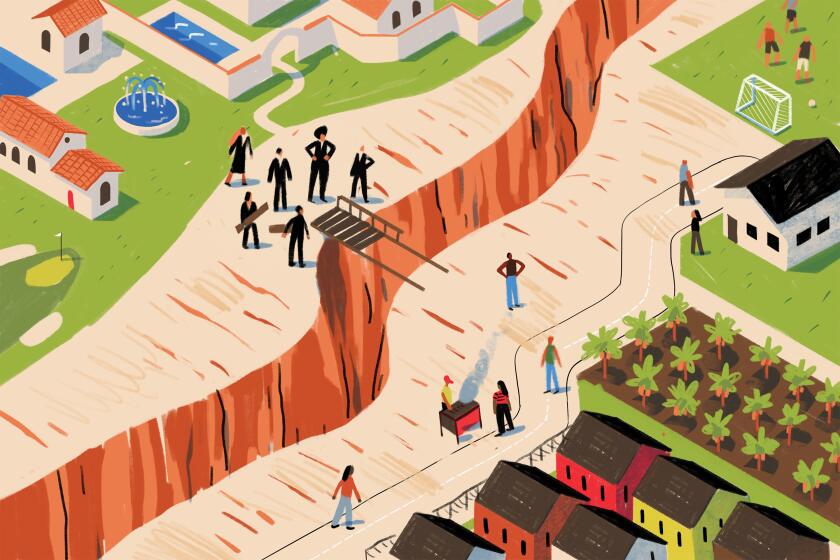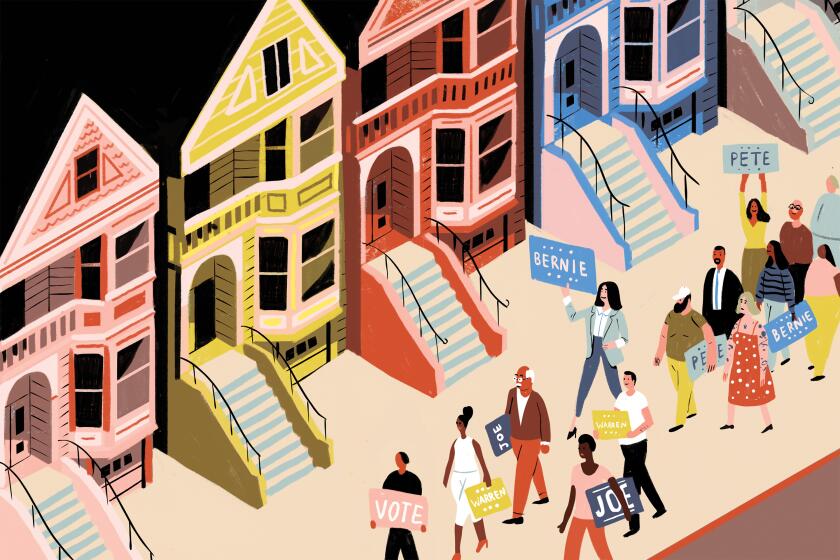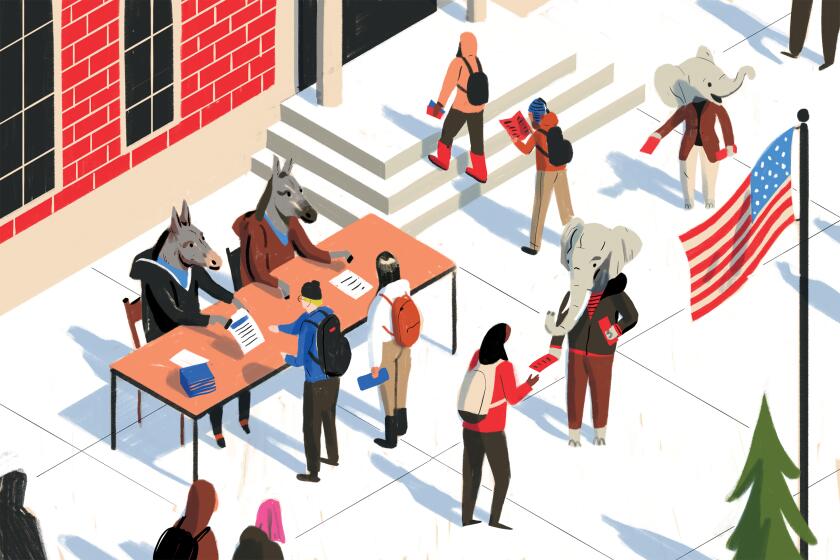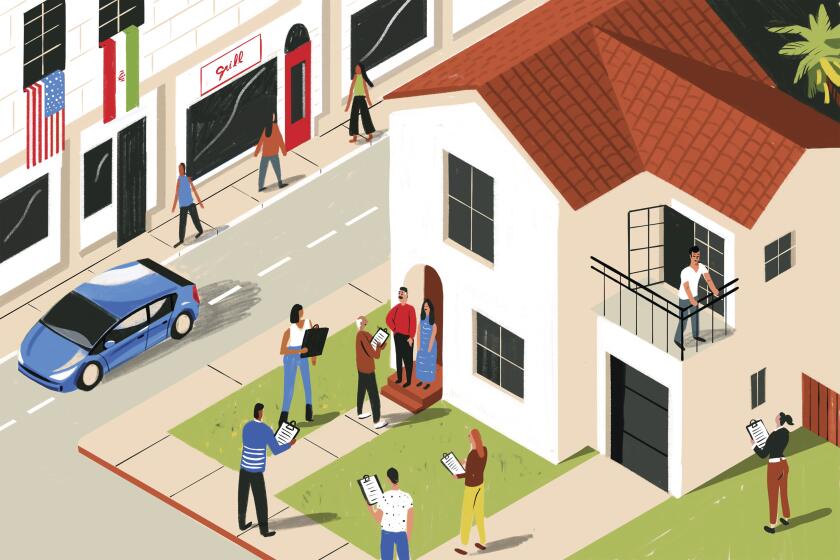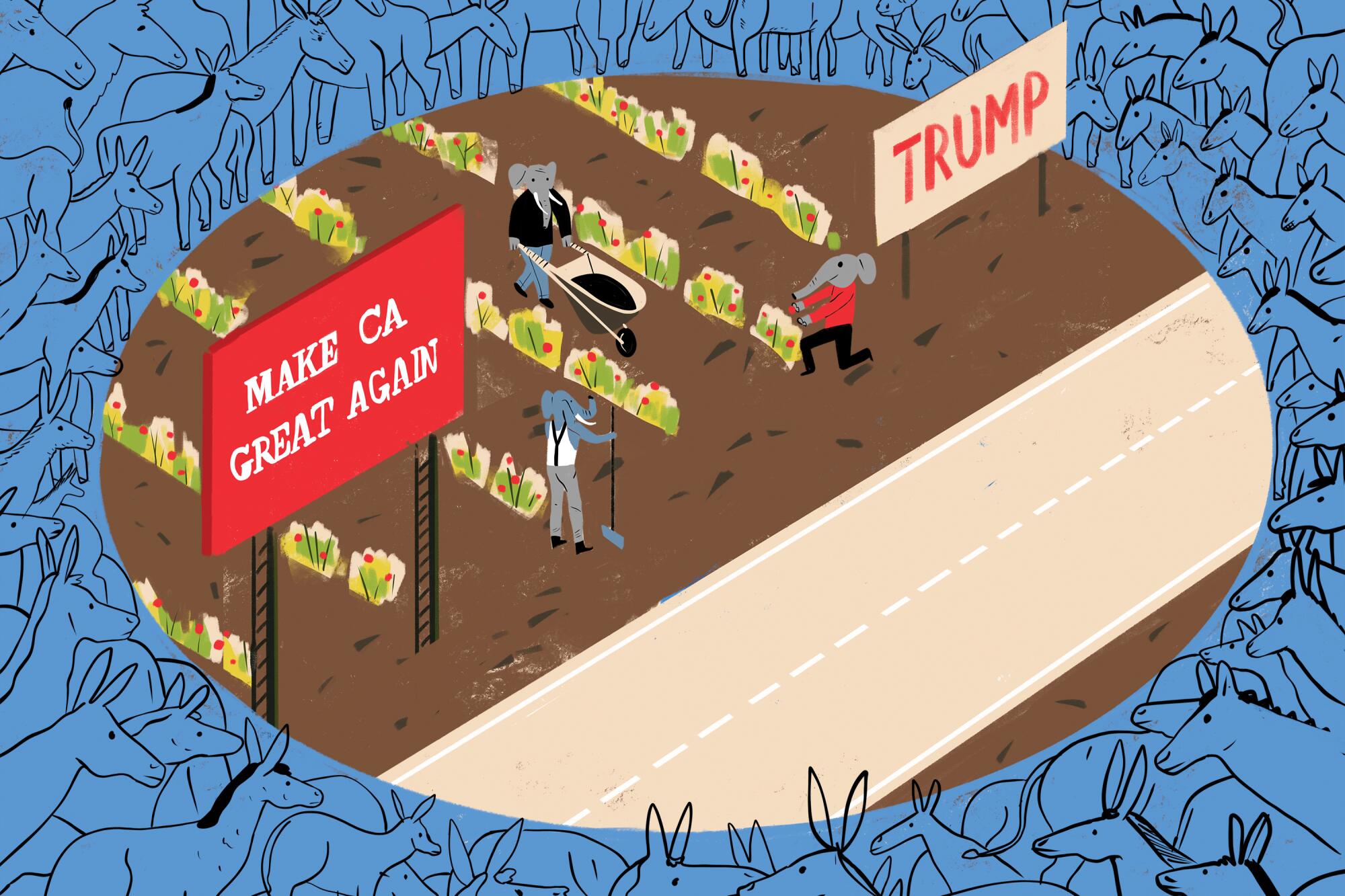
- Share via
VISALIA, Calif. — Up the backbone of California, north of Bakersfield, the billboards that dot state Route 99 speak volumes.
“Jesus is Lord,” says more than one. “Dam Water Grows Food,” proclaim several others. A picture of a mother and infant dominates another towering sign, which declares “Pro Woman, Pro Baby, Pro Life.”
If the visual cues don’t suffice, Central Valley conservatism comes with its own soundtrack, courtesy of KMJ talk radio. One of the region’s top-rated broadcast stations, KMJ features national stalwarts of the right and local host Ray Appleton, always ready to provide a platform to his friend Rep. Devin Nunes (R-Tulare), the congressman whom President Trump calls the left’s “worst nightmare.”
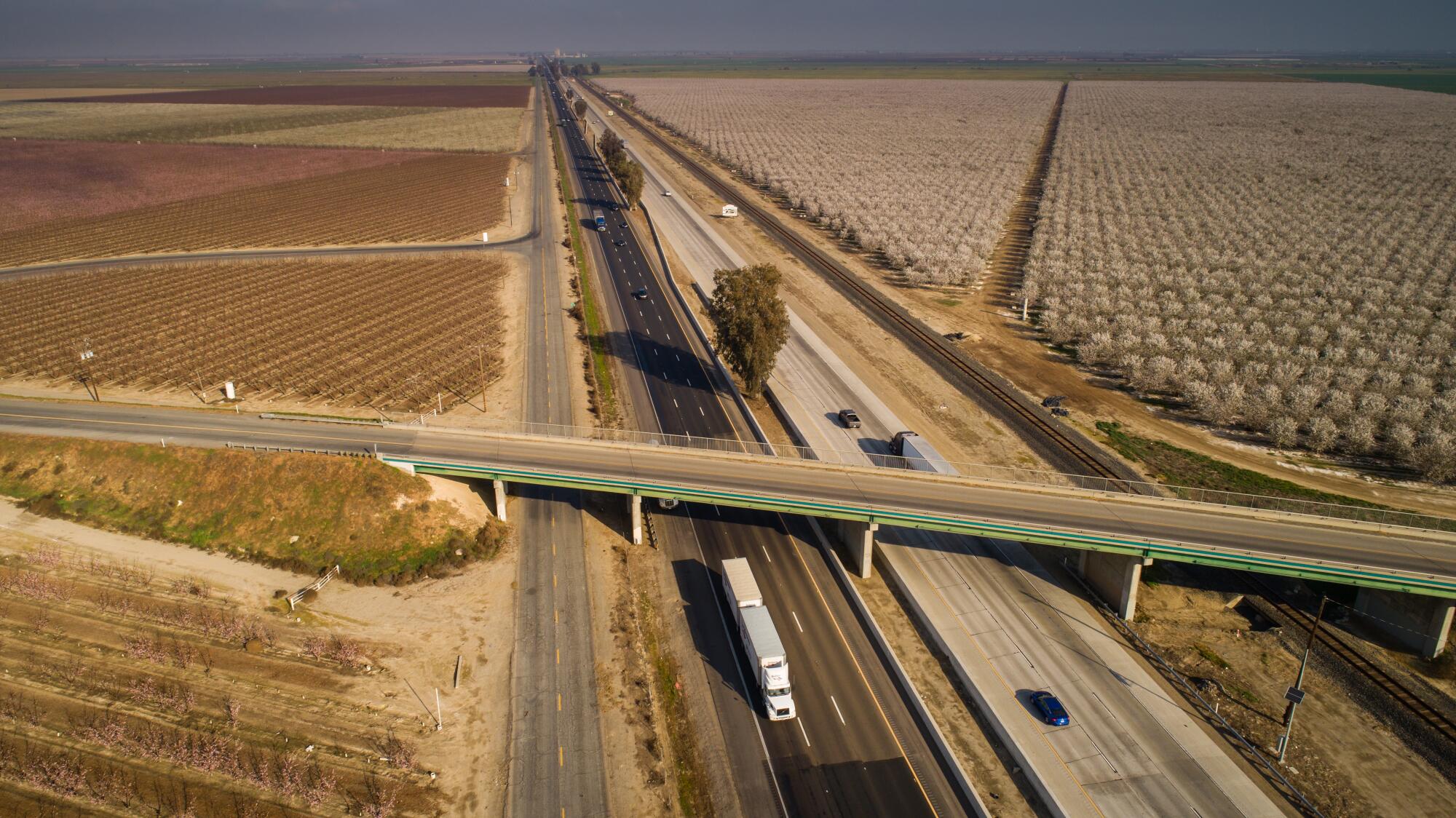
Here, a ruby Republican heart beats in sapphire blue California, or as one KMJ promotion puts it, a hub for “rational thinking in an irrational state.” That heart has missed a few beats in recent years as new voters, particularly Latinos, lean more liberal. But the Republican pulse keeps beating, even as Democrats dominate the state government and prepare for a March 3 primary election that will give them a larger say in their party’s presidential nominating contest.
For Democrats here, this year’s earlier primary looms as an opportunity — but one that feels fraught with peril. Aside from Bernie Sanders’ ardent admirers, party loyalists seemed flummoxed about who can best withstand, and counter, the withering attacks they see coming from Trump.
That contrasts sharply with Central Valley Republicans. Many sound bemused by the Democrats’ indecision (one called the opposition primaries an “ugly bonfire”) and optimistic that their favorite change agent can remain in the White House and stay attentive to a swath of the state they say is forsaken.
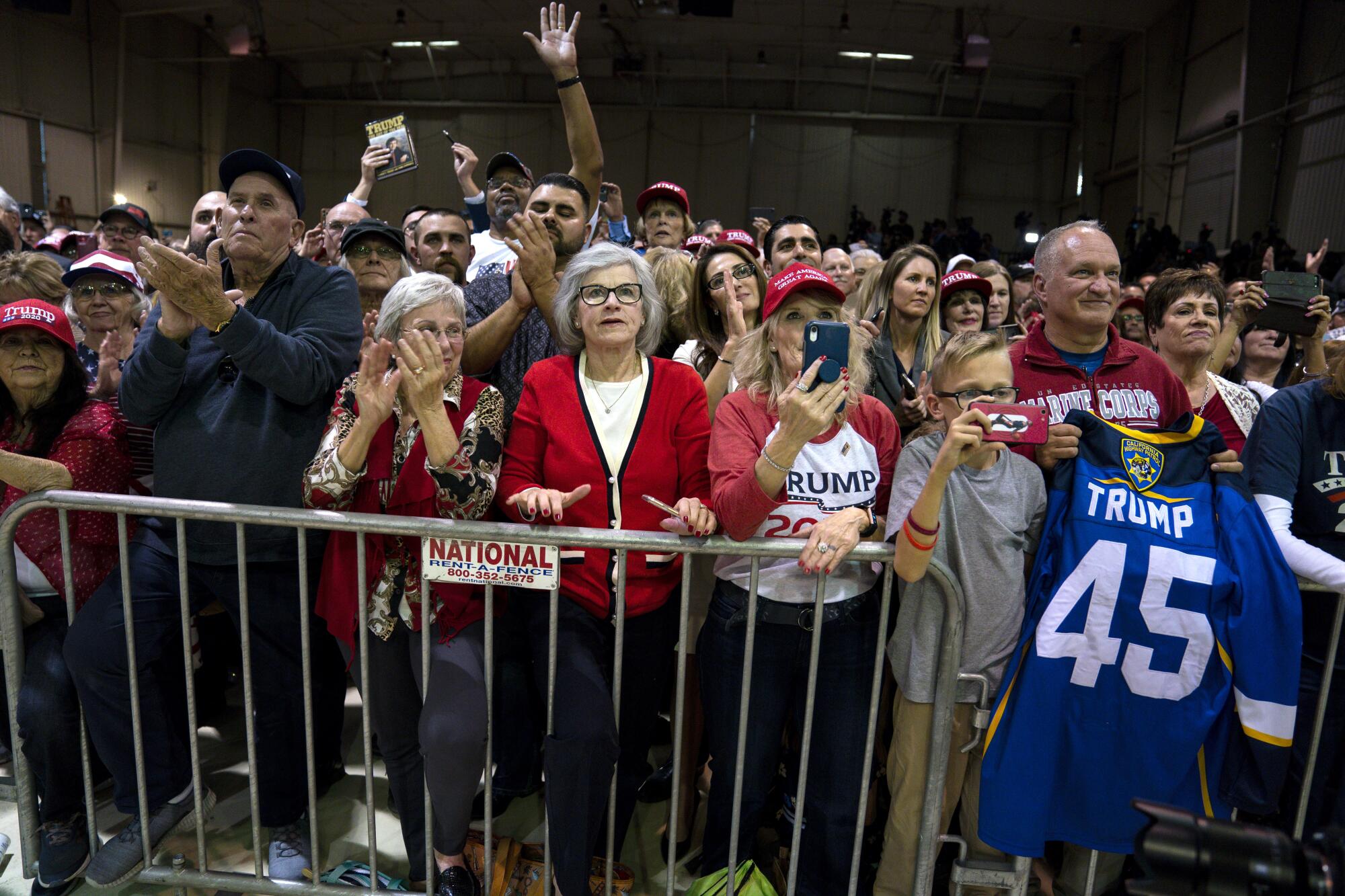
“Hannity talks about the middle of America feeling like they don’t have a voice,” said Brian Lancaster, a contractor who joined more than 100 other conservatives at a Fresno restaurant to watch Trump’s 2020 State of the Union address. “It can feel the same in California, being stuck between Frisco and L.A.”
“But that’s why Trump spoke to me, spoke to all of us out here,” added Lancaster, in an echo of Fox News host Sean Hannity. “He is someone who is looking out for the people in the middle, when the coastal elites try to rule everything and forget about people like us.”
At the heart of the Republican bastion in the Central Valley is Nunes’ 22nd Congressional District. Stretching from south of Tulare to the northeast corner of Fresno, mostly on the east side of Route 99, it is one of just seven congressional districts in California that remain in Republican hands. Democrats hold 46 others.
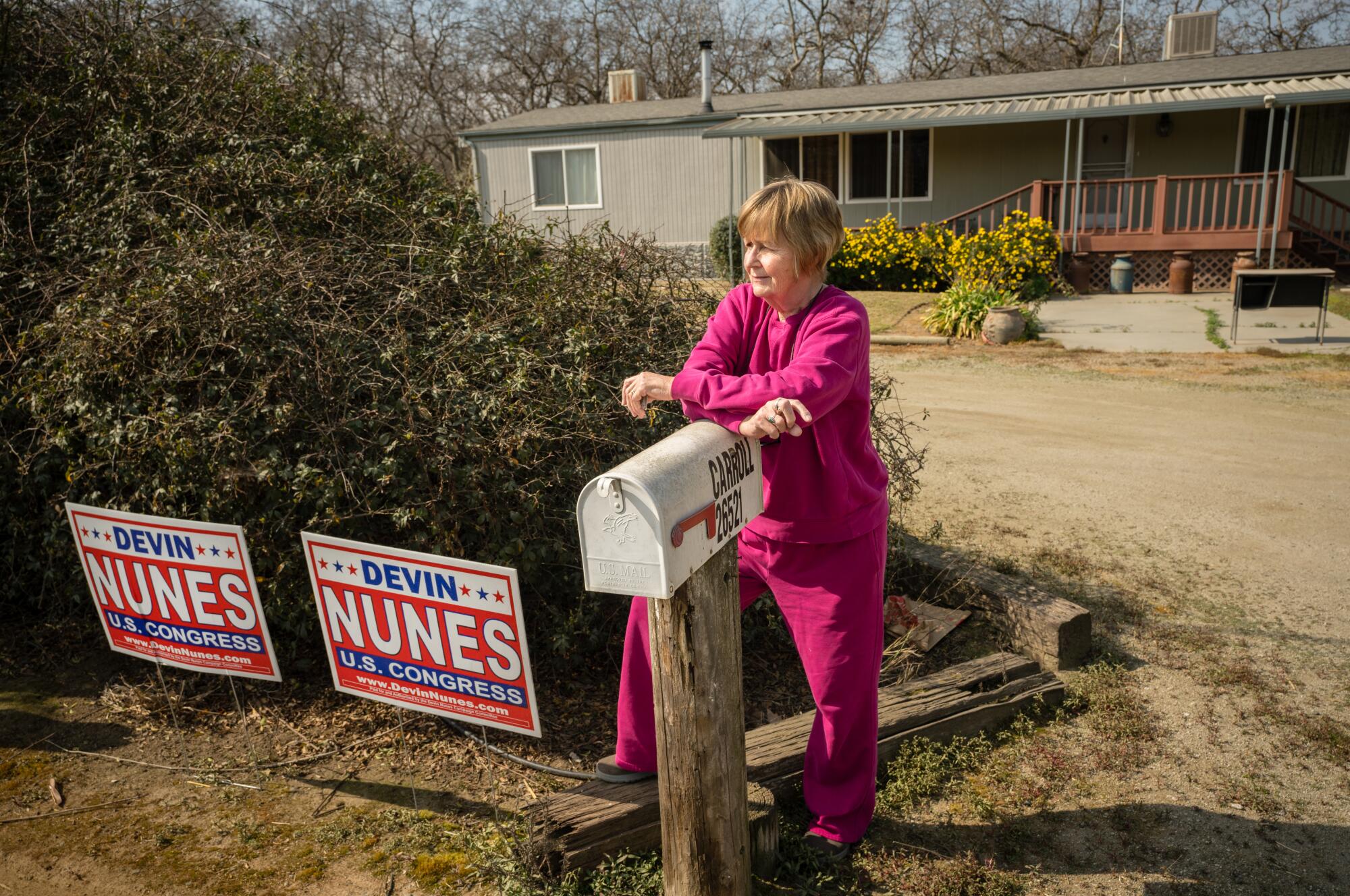
The GOP enjoys an advantage with 39% of registered voters here, compared with the Democrats’ 32%. While Hillary Clinton beat Donald Trump by more than 4.2 million votes statewide, the future president found a rare haven in the 22nd, where he ran up a 10-percentage-point victory.
The son of dairy farmers and a former trustee of the local community college district, Nunes routinely won reelection by double-digit margins among the farmers and dairymen he grew up with. He notched eight straight victories with little difficulty.
That changed in 2018. Nunes faced Democrat Andrew Janz, a prosecutor who portrayed the incumbent as an out-of-touch Washington insider and a sycophant of Trump.
Nunes, in turn, accused Janz of being the tool of outside interests (much of his $7 million in donations came from beyond the 22nd) and a believer in “San Francisco values.”
Nunes won. But his victory, by a little more than 5 percentage points, was a shadow of the 30- and 40-point blowouts that had been the norm.
Two other San Joaquin Valley districts flipped to the Democrats in 2018, making clear the region could no longer be considered a Republican lock. Democrat Josh Harder unseated Republican Jeff Denham in the 10th District, around Modesto. And in the district west of Nunes’ — filling much of the space between Route 99 and Interstate 5 — Democrat T. J. Cox scored a narrow win over Republican incumbent David Valadao.
The shift to the left has been particularly distinct in Fresno County. After decades of Republican dominion, the county voted for Barack Obama in two straight presidential races, then sided with Hillary Clinton over Trump in 2016. In January, two newly elected Latino members of the Fresno City Council solidified Democratic control. And Janz is back on the ballot in the March 3 primary, running for mayor of Fresno.
He said the rise of Latino voters and of young people looking for affordable housing away from the overpriced coast have changed the dynamic. “I think Fresno is kind of a microcosm of what’s happening throughout the rest of the Central Valley,” said Janz, the son of immigrants from Thailand and Canada. “We’re seeing it trend more blue.”
The encroach of those “San Francisco values” felt a long way off early this month when members of the Fresno County Republican Party gathered at a bar and grill in northwest Fresno to celebrate Trump’s State of the Union speech.
A mostly gray-haired group, sporting “Keep America Great” hats and other Trump regalia, packed in front of a big-screen television. GOP county chairman Fred Vanderhoof said they had been brought together by the power of “a blue-collar billionaire, who speaks from the heart.”
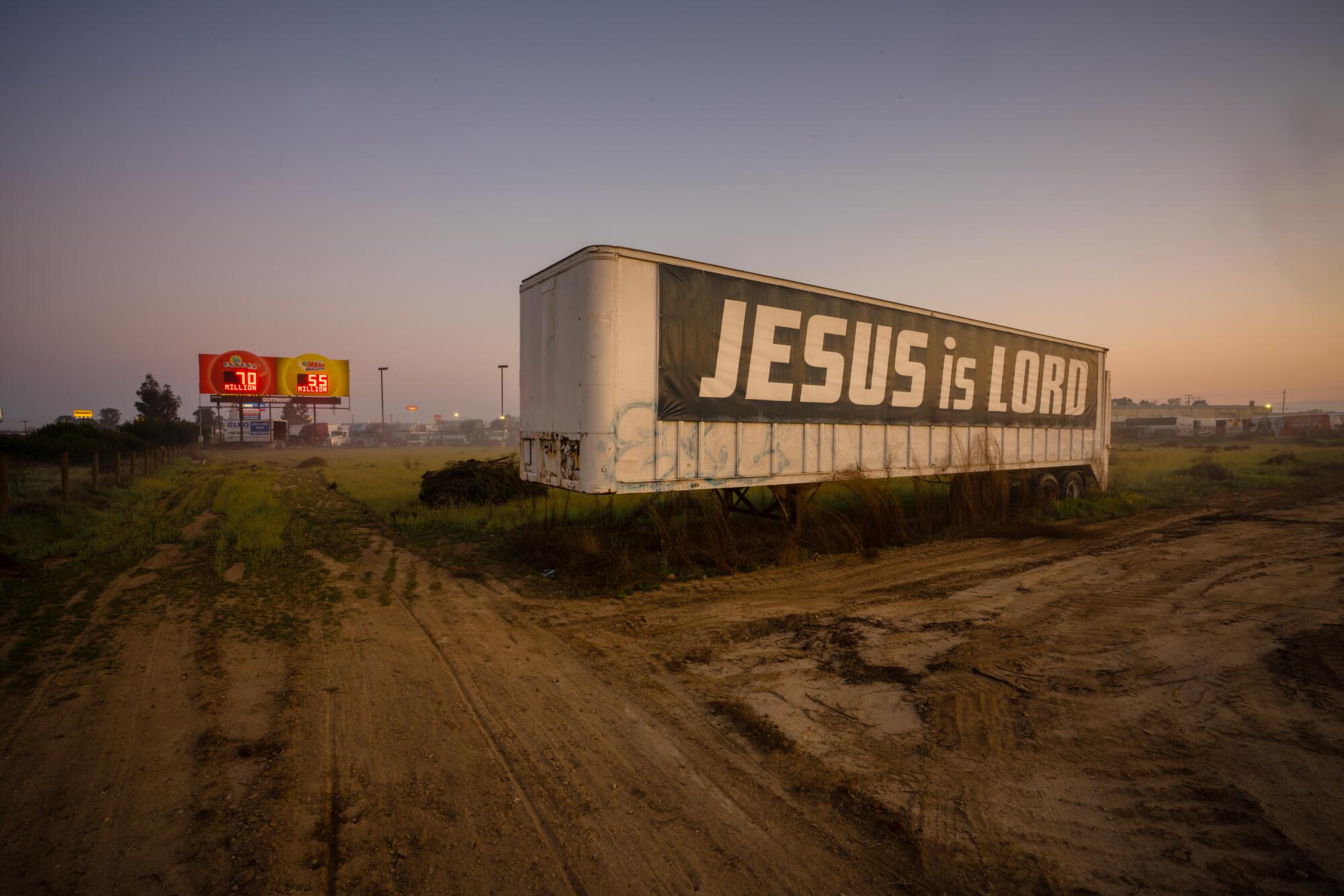
The whoops and applause for Trump began before he even started his speech, when he refused to shake hands with House Speaker Nancy Pelosi (D-San Francisco). The huzzahs hardly relented as Trump touted the nation’s economic strength (“Socialism sucks!” shouted one man), proposed a ban on late-term abortions (“Praise God!” whispered a grandfather) and declared victory over Islamic State. When Trump announced that he was reuniting Army Sgt. Townsend Williams with his family after a deployment in Afghanistan, the Fresnans chanted “U-S-A! U-S-A!”
Laura Cox, a teacher in the state prison system, said she had seen Trump’s rallies before and loved “the celebratory atmosphere, kind of like a concert. You get so pumped up.”
For Lancaster, the contractor, part of the appeal is pragmatic. He credits Trump for the decrease in his federal taxes. And his 401(k) has grown 17% in less than a year. “That’s real,” Lancaster said.
Glendon Becker, an insurance broker who once supported Republican moderate John Kasich for president, said he doesn’t like Trump’s taunting and name-calling. But he’s become willing to endure a breakdown of decorum because he believes the president is “making things work.” Becker explained: “I think the new trade agreements are good for us. I think he backed North Korea down. And he backed Iran down.”
For many Central Valley farmers, Trump’s declaration of war on government regulation has been especially welcome. While environmentalists and fishing captains support reduced water allocations to agriculture to protect endangered fish, Trump has promised, literally, to open the floodgates. In Bakersfield last week, Trump inaccurately declared that California had not experienced a drought, but merely regulatory roadblocks that he was clearing.
Farmer Larry Starrh of Shafter described how his family had considered selling their farm, where thousands of acres had been idled by “environmental takings.” But his father fought to keep going. “He said, ‘Trump is going to get things done.’ He said, ‘He’s our hope,’ ” Starrh told the Bakersfield rally. “And it’s a fact, Mr. President, you have got things done and you have, indeed, renewed our hope.”
Democrats in the region feel more like Republicans do about greater California — like a righteous minority fighting against an oppressive majority. They are desperate to find a candidate who can end the Trump siege. The most persistently passionate have been Sanders supporters, said Lisa Bryant, an assistant professor of political science at Fresno State University.
“California may be way more liberal than other states. People might say, ‘There goes crazy old California,’ ” said Mickey Chacon, a Sanders volunteer and a senior at Fresno State. “But we have the power and the most votes. We can set the trend for the rest of the Democratic Party.”
Democrats in Tulare County express more trepidation. Jody Graves, a walnut farmer whose family founded a major food packaging operation, quoted a fellow Democrat who said attempts to gain a foothold in the the county “feel like missionary work.” He added: “It’s rare you can move beyond a few like-minded people. And when you do, you kind of choose your words carefully.”
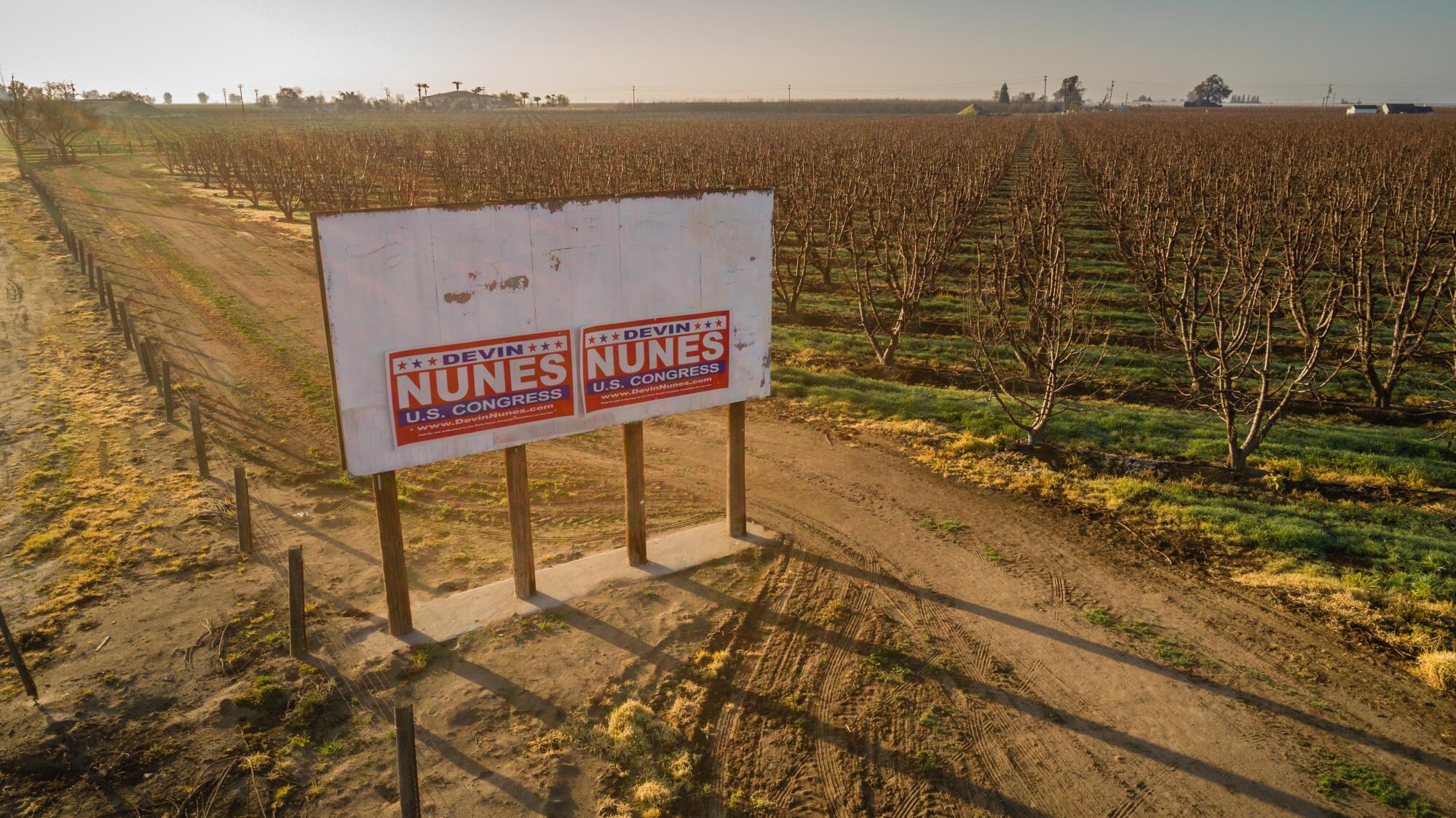
George Pilling, who ran public libraries in the community before retiring, hopes for a strong Democratic challenge to Trump. But, like many Democrats across the nation, the men are unsure who would be their strongest candidate. Pilling has leaned toward Elizabeth Warren, while Graves believed Michael R. Bloomberg, with his background as mayor of New York, “seems like the only one who would be a street fighter, who could counterpunch against Trump.”
The two men aired their anxieties at the 210 Cafe in downtown Visalia. Not long after the Democrats vacated their table, another gaggle of retirement-age men ambled into the cafe. Some of them have been meeting for decades in the farm town, settling the world’s problems and playing a number-guessing game to decide who pays for coffee.
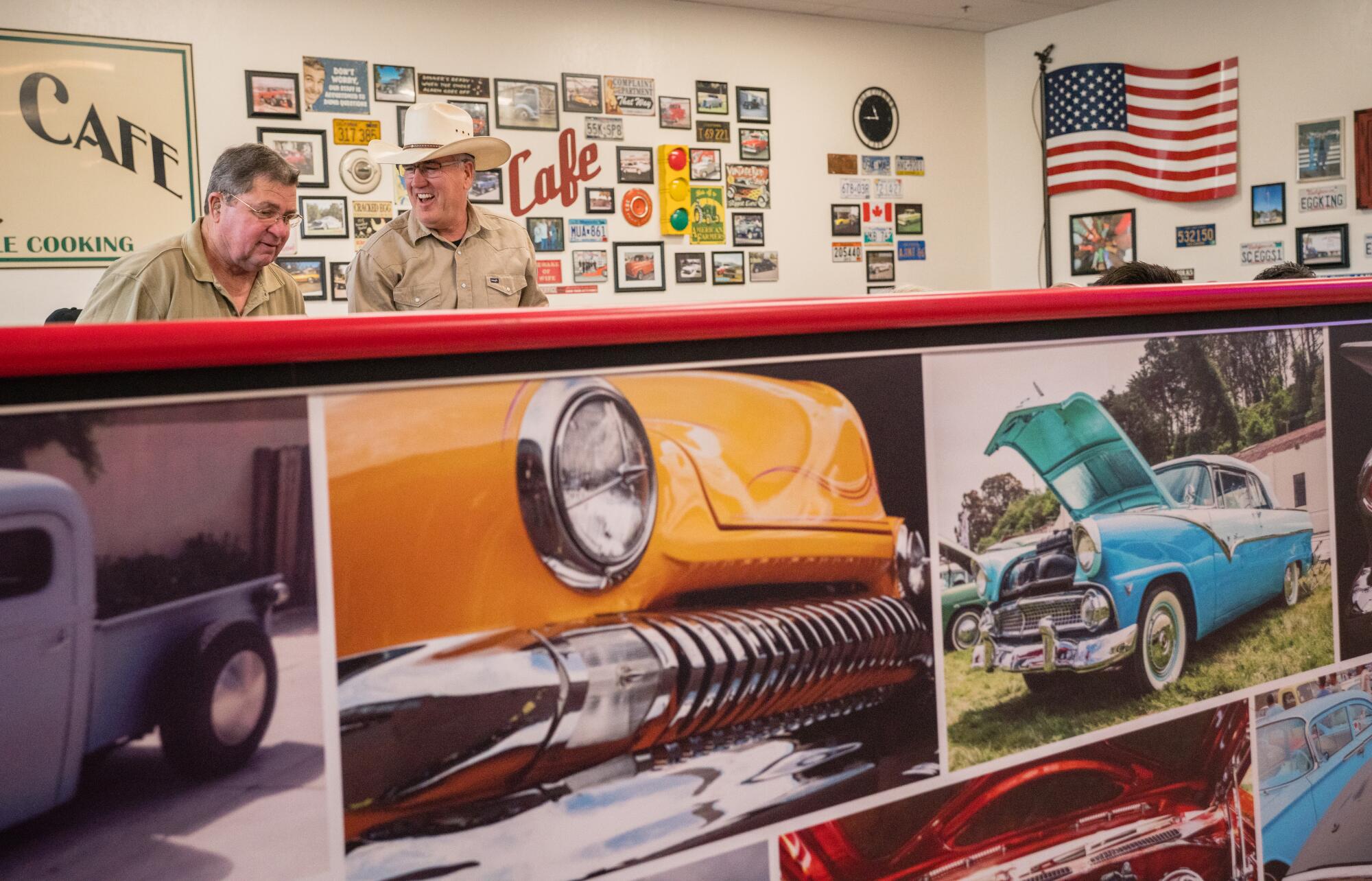
The morning after Trump’s State of the Union, the group is nearly all Republican and nearly unanimous that the president won the evening. Heads shook in disgust as they recalled Pelosi ripping up a copy of the president’s speech.
“They have not stopped complaining for a moment since he came into office,” one of the regulars, Visalia Mayor Bob Link, said of the Democrats. “They have spent so much time doing that that they have not developed a candidate of their own.”
More to Read
Get the L.A. Times Politics newsletter
Deeply reported insights into legislation, politics and policy from Sacramento, Washington and beyond. In your inbox twice per week.
You may occasionally receive promotional content from the Los Angeles Times.

